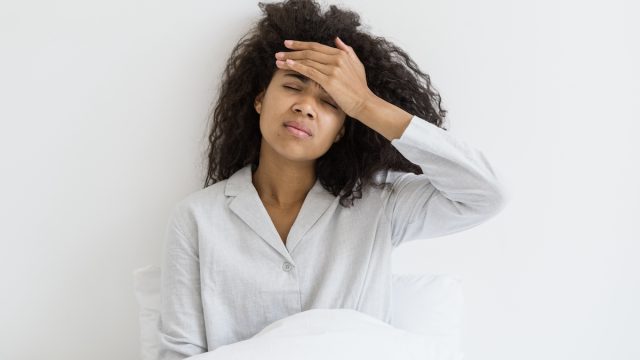7 Clothing Items You Should Never Sleep In, Experts Say
You might be surprised by how much your pajamas can affect your sleep.
Whether you buy matching PJ sets or go to bed in old, oversized t-shirts, unbeknownst to you, your nightwear could be affecting how well you sleep. "Generally, it is best to sleep in loose-fitting, cool, breathable pajamas at night," says Tony Klespis, a certified sleep science coach at MattressClarity. But, of course, it's not that simple. Keep reading to hear from healthcare professionals and sleep experts about which clothing items you should never sleep in. Your pajama drawer might be in for a refresh.
READ THIS NEXT: If You're Over 50, Sleeping With This Item Can Prevent Night Sweats.
1
Underwear
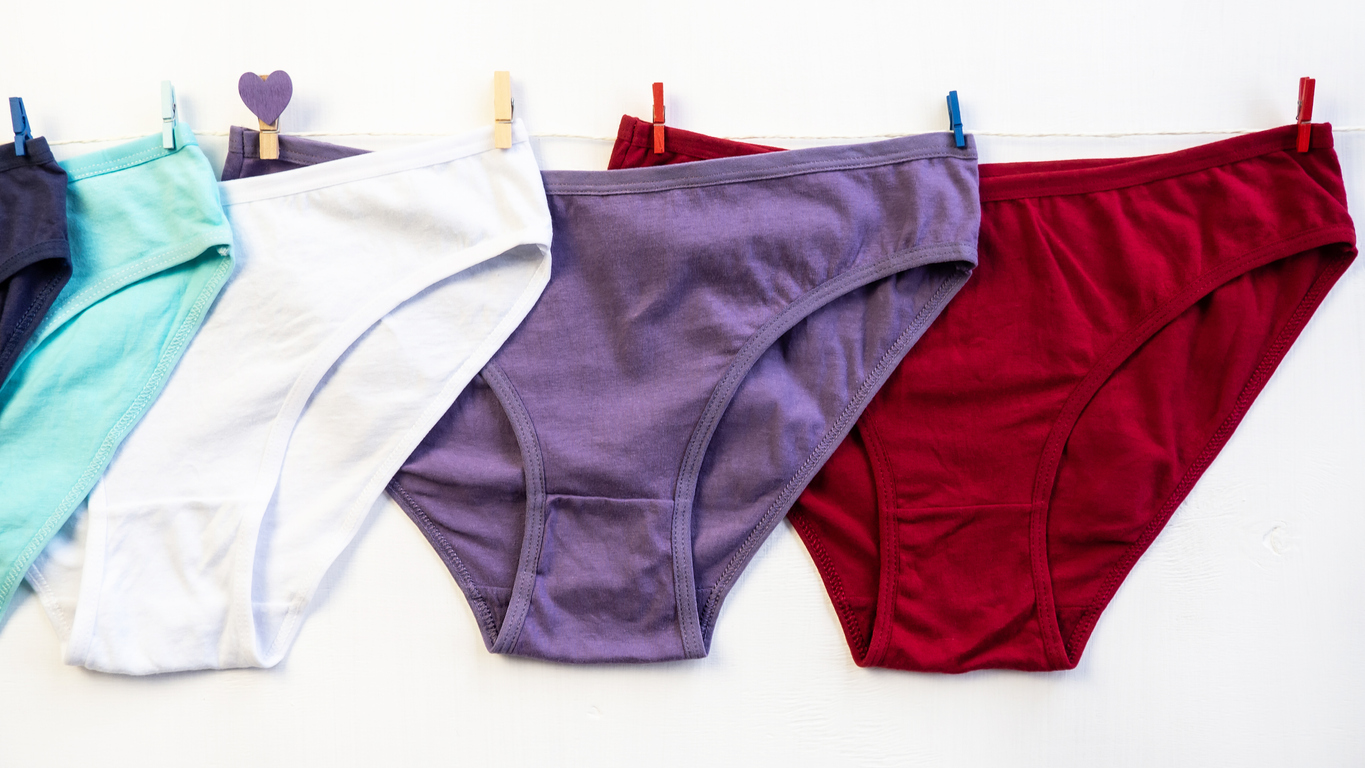
If your undies are tight, they can cause problems during the night. "[It] can lead to bacteria growth and yeast infections in women and potentially decrease sperm production in males," warns Klepsis.
As Healthline explains, "Candida, the bacteria responsible for yeast infections, thrives in warm, moist environments." For men, "Warm, wet genitals are a breeding ground for fungi like tinea cruris, or jock itch." If you do wear underwear, something 100 percent cotton is your best bet.
Likewise, ditch the bra. "By repeatedly rubbing against your skin and generating friction, irritation, and skin damage, too-tight bras can lead to hyperpigmentation," a condition in which the skin darkens, cautions Jen Wan, co-founder of skincare company Soteri Skin.
2
Tight or heavy pajamas
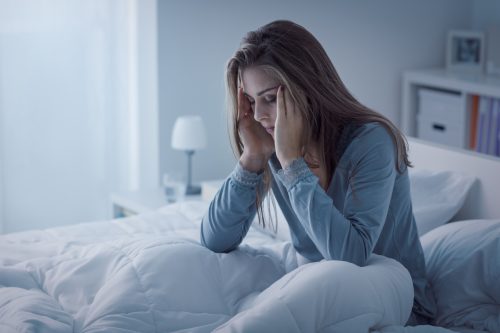
"Tight clothes can restrict circulation in your body and disrupt airflow throughout the night, leading to discomfort and poor sleep quality," says James Oliver, lead researcher, sleep expert, and founder at Hey Mattress. In addition, tight clothing prevents you from being able to move freely in your sleep.
Jill Zwarensteyn, a certified sleep science coach and the editor at Sleep Advisor, adds that tight pajamas can also raise your body temperature throughout the night, which can disrupt your sleep. For this reason, you should also avoid very heavy fabrics like flannel or fleece.
As WebMed explains, "As your body cools, your pineal gland, located in your brain, releases rising amounts of the hormone melatonin," which helps manage sleep. Being too warm can cause this process to break down.
READ THIS NEXT: 20 Doctor-Approved Tips to Get a Full Night's Sleep Tonight.
3
Synthetic fabrics
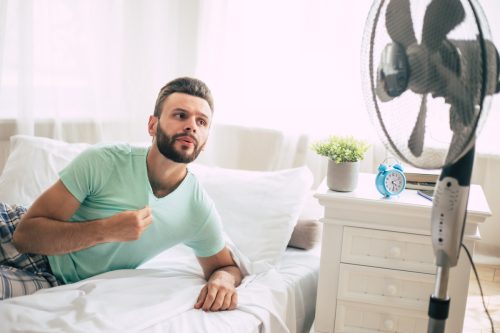
Synthetic fabrics like polyester and nylon can also interfere with temperature regulation at night. "These fabrics can cause discomfort while sleeping since they don't allow your skin to breathe, trapping body heat and leading to overheating during the night," explains Oliver.
Chris McDermott, an advanced practice registered nurse (APRN) at Intercoastal Consulting & Life Care Planning, says that since synthetic fabrics aren't breathable, they "can trap heat and moisture, which can lead to skin irritation and fungal infections."
Jeff Kahn, co-founder and CEO at Rise Science, adds that one common thing to watch out for is sleepwear (or even bedding) labeled as microfiber, as it's actually polyester "and should be avoided if possible."
Instead, opt for pajamas made of natural fabrics like cotton, linen, or bamboo. Amelia Jerden, sleep product review specialist and certified sleep science coach at Sleepopolis, says she highly recommends the cooling pajamas from Cozy Earth. "The fabric is bamboo, which is great for temperature regulation and moisture-wicking… I sleep in these pajamas fairly regularly and can attest that they are ultra-comfy, high-quality, and very cooling."
4
Dark colors
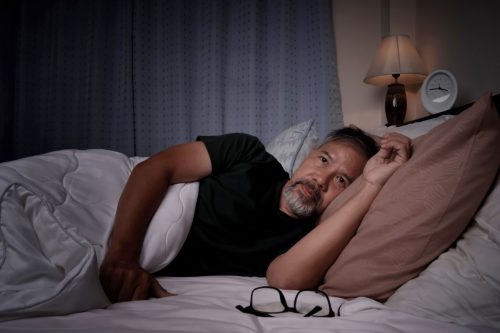
If you have sensitive skin, you may want to avoid PJs that are dark in color, even if they are breathable. Along with synthetic fabrics and chemicals used to make clothing wrinkle-resistant, dyes "are more likely to cause contact dermatitis—any itchy, red rash that is usually worse where fabrics cling against like the armpits, groin, back of knees, and arm creases," explains Patricia Pinto-Garcia, MD, MPH, medical editor at GoodRx. "Lighter color clothing is typically made with less dye so it's less likely to cause contact dermatitis."
For more sleep advice sent directly to your inbox, sign up for our daily newsletter.
5
Anything with fasteners
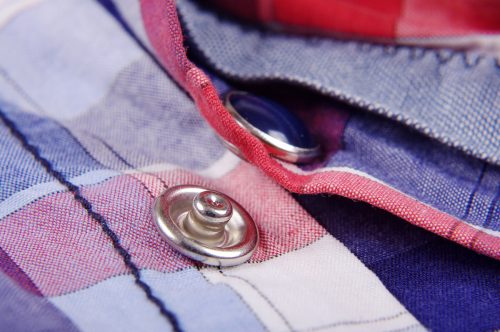
Pinto-Garcia advises against wearing pajamas with any type of metal snap or zipper. "Most clothing fasteners contain nickel and over time you can develop a nickel allergy (even as an adult)… So, if you can cut out 8 hours/day of nickel exposure, you can really save your skin."
6
Clothes you wore all day

Take a look back at how you've spent the last ten to twelve hours. Did you sit in a doctor's office? Take an Uber? Just because your clothing doesn't look dirty, doesn't mean you should climb into bed wearing it.
"I highly recommend that you never sleep in dirty clothes," says Oliver. He cautions that the bacteria and potential skin allergens can cause "skin irritation and difficulty falling asleep," as well as illness.
This is especially true if you have seasonal allergies. "Pollen and other allergens are tiny and stick to fabrics," notes Pinto-Garcia. "If you wear these clothes overnight, you're exposing yourself to additional hours of allergies which can make your allergy symptoms (sneezing, coughing, runny nose, watery/red/swollen eyes) worse."
7
Earrings

They're not exactly clothing, but earrings are an item many people forego removing before bed. "Earrings can get caught on items such as your hair and rip through your earlobe," notes Lexi Taub, founder of Alexis Jae Jewelry. "It is extremely dangerous to sleep in earrings and should be avoided—even on nights you're feeling lazy."
